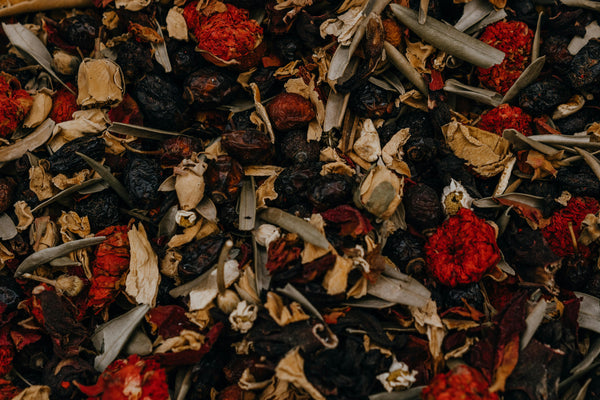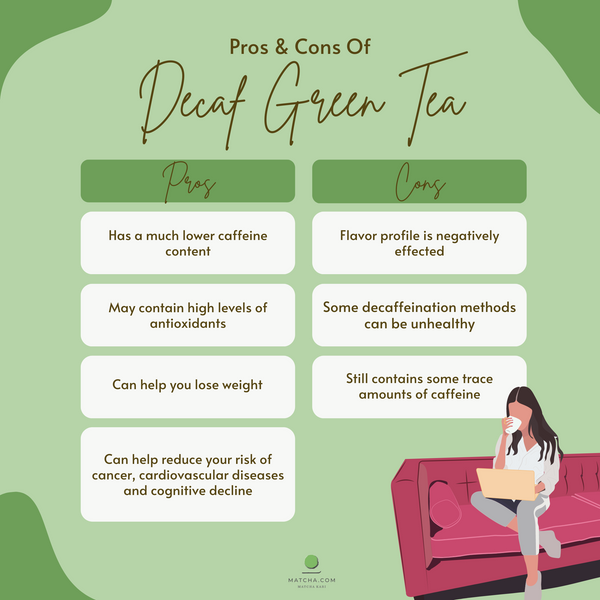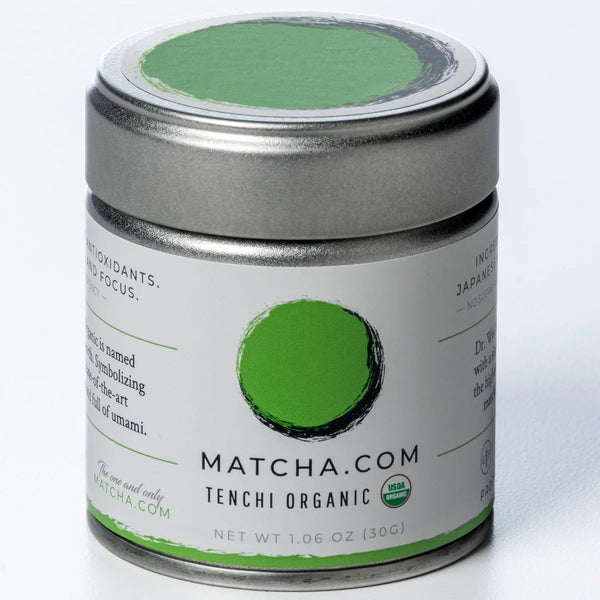Whether you have caffeine sensitivity, don’t sleep well if you’ve had caffeine during the day, or just want to try out your daily routine sans caffeine, decaf green tea might be the answer for you! Read on to learn more about decaf green tea, how it’s made, and the differences in health benefits and taste between decaf and regular green tea. 
What is decaf green tea?
Decaf is short for decaffeinated and refers to types of tea that have undergone a process to change them from their original caffeinated state in order to remove as much caffeine as possible.
A really important thing to note about decaf tea is that it’s not 100% caffeine-free. Most decaf tea contains somewhere between 1- 8 mg of caffeine, and most caffeinated tea contains between 25 - 60 mg, depending on the tea type and how the tea leaves are processed. The amount of caffeine in decaf tea is considered so minor that you most likely won’t feel any physical effects of the caffeine, but if caffeine consumption is a threat to your health and not just a personal preference, it’s important to know that decaf does contain trace amounts of caffeine.
What is caffeine-free tea? 
The difference between caffeine-free and decaf tea is that caffeine-free tea is tea that naturally does not contain any caffeine and never has.
Herbal teas like chamomile, mint, and ginger are considered caffeine-free and contain 0 mg of caffeine.
How is decaf tea made?
There are four main processes for decaffeinating tea, and only two of the four do not require the use of chemicals. All of the methods cause some degree of damage to the tea leaves and cause varying degrees of change to their taste and chemical composition.
-
Methylene Chloride Decaffeination
For this method, tea leaves are soaked in methylene chloride and the caffeine molecules bond to the molecules of methylene chloride which reduces the number of caffeine molecules in the tea. This method preserves the taste of the tea fairly well, but is highly controversial given the toxicity of methylene chloride and how intensely regulated this method needs to be in order to ensure that the tea is safe to drink.
-
Ethyl Acetate Decaffeination
This is the most common of tea bag decaf methods and is often referred to as “natural decaffeination” because ethyl acetate is an ingredient naturally found in tea.
Similar to methylene chloride decaffeination, this method of decaffeination also requires soaking the leaves in a solvent in order to remove the caffeine molecules. Unfortunately, ethyl acetate is really difficult to remove from the tea leaves after it's been used as a solvent. While consuming trace amounts of ethyl acetate won’t hurt you, it does leave behind a chemical-like taste that changes the flavor of tea. Another major drawback of ethyl acetate decaffeination is that it strips the tea of a majority of its antioxidant properties and health benefits, leaving behind only ~18% of the tea’s original polyphenol (antioxidant) count.
-
Water Decaffeination
Done by essentially double brewing tea in hot water and getting rid of the first brew that is thought to contain the most caffeine, this is one of the two decaf methods that does not include the use of chemicals as solvents. Unfortunately, it’s also the least effective method for reducing the amount of caffeine in tea and does not preserve the taste and antioxidant count very well.
-
Supercritical CO2 Decaffeination
This is the coolest and best way to decaffeinate tea! CO2 is nontoxic, nonflammable, colorless, and odorless, and when put under extreme pressure, it can act as a very efficient solvent for removing caffeine from tea.
Tea leaves are first wet and then put under pressure. Next, pressurized CO2 is pumped over the leaves. During this process, the caffeine molecules bind to the CO2. The caffeine-rich CO2 is then filtered out of the chamber containing the tea leaves, the leaves are dried, and voila. CO2-decaffeinated tea retains most of its taste and ~92% of its antioxidant count. 
Can I decaffeinate tea at home?
Yes, via the water processing method, but studies show that doing this at home likely only decreases the caffeine content of tea by 9%.
Is decaf green tea still healthy?
The simple answer is yes, decaf green tea still contains health benefits, but the way the tea is decaffeinated has a big effect on how many antioxidants it contains. If decaffeinated via the supercritical CO2 method, you’ll still get ~92% of the tea’s original antioxidant power, but if any other method of decaffeination is used, you risk getting only ~18% of the tea’s original antioxidant power.
The antioxidants in green tea can help improve cognitive brain function, reduce the risk of chronic diseases, improve cardiovascular health, reduce the risk of cancer, improve gut health, and more! The more EGCG, catechins, and polyphenols in green tea, the stronger the health benefits.
One type of antioxidant in green tea is catechins. Catechins are believed to be a main component in fat burning and fat loss. Decaf green tea still contains catechins, so it may have a positive effect on weight loss.
Decaf tea can also help reduce overactive bladder syndrome, and a lower caffeine content can help reduce the risk of osteoporosis.
Pros and cons of decaf tea 
Can matcha green tea be decaf?
You can buy decaf matcha green tea powder, but we don’t recommend it. Matcha is known for its unique and delicious flavor and very high antioxidant content. Decaffeinating matcha green tea sacrifices its flavor profile and some of its health benefits.
What are the differences between decaf tea and decaf coffee?
Decaf tea and decaf coffee are decaffeinated using exactly the same processes—methylene chloride, ethylene acid, and CO2. Therefore, decaffeinating coffee has the same drawbacks as decaffeinating tea. Both decaf coffee and decaf tea lose some or most of their flavor.
But unlike tea, which has tons of health benefits even when decaf, coffee may do more harm than good to your body. Among other negative side effects, coffee causes a caffeine crash and can stain your teeth! Even if decaf coffee doesn't cause you to crash like regular coffee, it still doesn’t even come close to bringing you the health benefits that regular and decaf green tea bring.
P.S. If you drink coffee to help you go #2 … matcha is even better for gut health than coffee!
Should I drink matcha green tea or decaf coffee?
If your main motivation for trying decaf is because you get the coffee jitters, crash hard from coffee or just overall don’t like the way coffee makes you feel, you should try matcha green tea before going decaf!
Matcha contains l-theanine, a compound that causes caffeine to be released at a slower, more consistent pace in your body. L-theanine eliminates the feeling of a caffeine crash, and it’s an antioxidant that can bring down high blood pressure, help you feel focused & calm, reduce stress, improve sleep quality, and provide immune support. Matcha green tea contains 5x the amount of L-theanine than regular green tea and coffee has none! Matcha also comes in delicious flavors and can be made into tons of food and drink recipes!
Bottom line
While decaf green tea can be a great option for people looking to reduce their caffeine intake, the decaffeinating method often compromises its flavor and health benefits. Unless you have a caffeine-related health risk, we suggest trying matcha green tea to get tons of health benefits and experience the focus and energy that caffeine can bring without the crash that comes with drinking coffee.
Disclaimer: These statements in this blog post have not been evaluated by the Food and Drug Administration. The information provided here is for educational purposes only and should not be considered medical advice. It's essential to consult with a qualified healthcare professional before making any dietary or lifestyle changes.
Resources:
UK, B. & B. (2022). Taste the difference challenge! – the benefit of decaffeinated tea and coffee - bladder & bowel UK. Retrieved from https://www.bbuk.org.uk/taste-the-difference-challenge-the-benefits-of-decaffeinated-tea-and-coffee/
Roberts, J. D., Willmott, A. G. B., Beasley, L., Boal, M., Davies, R., Martin, L., Chichger, H., Gautam, L., & Del Coso, J. (2021). The Impact of Decaffeinated Green Tea Extract on Fat Oxidation, Body Composition and Cardio-Metabolic Health in Overweight, Recreationally Active Individuals. Nutrients, 13(3), 764. https://doi.org/10.3390/nu13030764
Baba, Y., Inagaki, S., Nakagawa, S., Kaneko, T., Kobayashi, M., & Takihara, T. (2020). Effect of Daily Intake of Green Tea Catechins on Cognitive Function in Middle-Aged and Older Subjects: A Randomized, Placebo-Controlled Study. Molecules (Basel, Switzerland), 25(18), 4265. https://doi.org/10.3390/molecules25184265
Lee, S., Park, M. K., Kim, K. H., & Kim, Y. S. (2007). Effect of supercritical carbon dioxide decaffeination on volatile components of green teas. Journal of food science, 72(7), S497–S502. https://doi.org/10.1111/j.1750-3841.2007.00446.x
Henning, S. M., Fajardo-Lira, C., Lee, H. W., Youssefian, A. A., Go, V. L., & Heber, D. (2003). Catechin content of 18 teas and a green tea extract supplement correlates with the antioxidant capacity. Nutrition and cancer, 45(2), 226–235. https://doi.org/10.1207/S15327914NC4502_13
Williams, J. L., Everett, J. M., D'Cunha, N. M., Sergi, D., Georgousopoulou, E. N., Keegan, R. J., McKune, A. J., Mellor, D. D., Anstice, N., & Naumovski, N. (2020). The Effects of Green Tea Amino Acid L-Theanine Consumption on the Ability to Manage Stress and Anxiety Levels: a Systematic Review. Plant foods for human nutrition (Dordrecht, Netherlands), 75(1), 12–23. https://doi.org/10.1007/s11130-019-00771-5
Wang, J., Zhang, Y., Liu, Y., Zhang, S., Yuan, L., Zhong, Y., Wu, X., Yang, J., & Xu, Z. (2022). Multi-Metabolomics Coupled with Quantitative Descriptive Analysis Revealed Key Alterations in Phytochemical Composition and Sensory Qualities of Decaffeinated Green and Black Tea from the Same Fresh Leaves. Foods (Basel, Switzerland), 11(20), 3269. https://doi.org/10.3390/foods11203269







